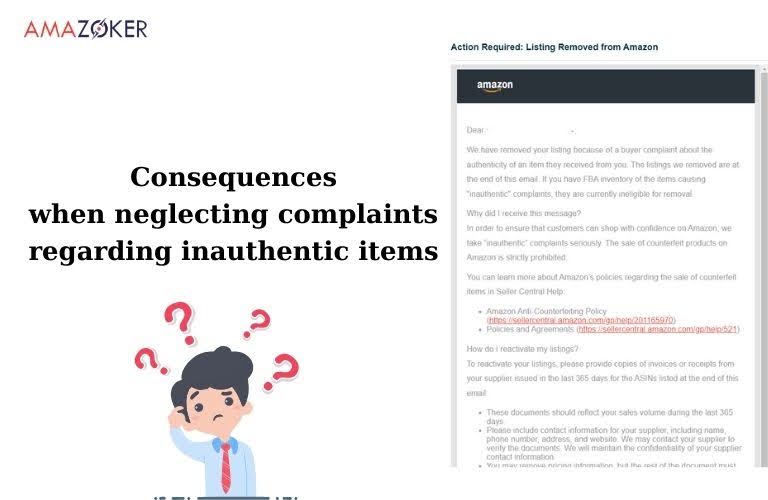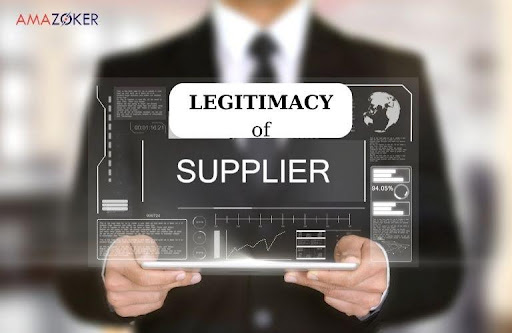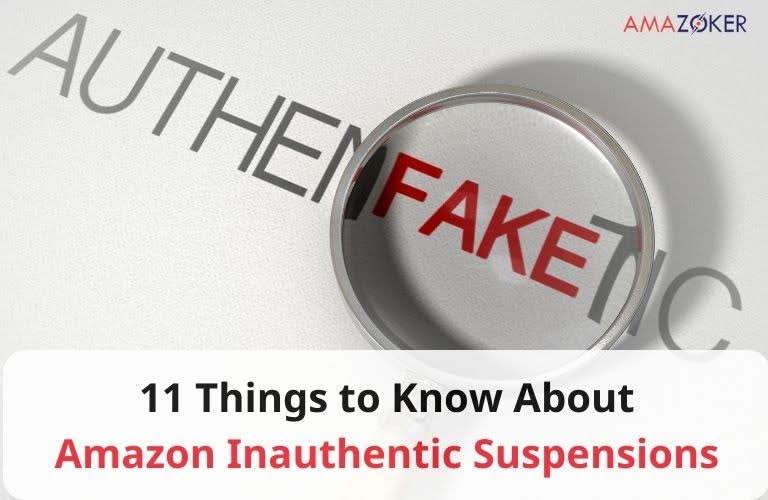Selling on Amazon can be a lucrative venture, but it comes with its own set of challenges. One of the most dreaded challenges for sellers is Amazon inauthentic suspensions. This blog explores 11 crucial aspects of Amazon inauthentic suspension, shedding light on the heavy-handed enforcement, repercussions of ignoring complaints, and the process of reinstatement.
Table of Contents
- What is the reason behind Amazon’s rigorous enforcement of Amazon inauthentic suspensions?
- Do private label brands receive warnings about “inauthentic item” issues and face ASIN suspensions?
- What consequences might arise from neglecting complaints regarding inauthentic items?
- Do sellers frequently face suspensions due to complaints about inauthentic items?
- What criteria do they examine when reviewing your invoices and supplier information for acceptance?
- What criteria does Amazon typically look for to confirm the legitimacy of your supplier?
- If you lack a supplier or do not possess invoices, what steps should you take?
- 1. Open Communication with Amazon
- 2. Investigate the Issue
- 3. Provide Detailed Information
- 4. Build a Case for Authenticity
- 5. Amazon inauthentic suspensions – Develop a Plan of Action
- 6. Implement Preventive Measures
- 7. Consider Professional Help – Amazon inauthentic suspensions
- 8. Appeal Multiple Times if Necessary
- What type of action plan do they anticipate from you in order to restore your privileges?
- If reinstatement is unattainable, will you ultimately receive your funds?
- How many attempts at an appeal are allowed, and how extensively will they review suppliers or invoices during the process?
- The best Amazon Inauthentic Suspension Appeal Services
What is the reason behind Amazon’s rigorous enforcement of Amazon inauthentic suspensions?
Amazon is notably stringent when enforcing inauthentic complaints for several reasons. The platform places a strong emphasis on customer trust and maintaining the integrity of its marketplace. Here are some key reasons why Amazon takes a heavy-handed approach in enforcing inauthentic complaints:
- Customer Trust and Satisfaction:Ensuring that customers receive authentic products is crucial for building and maintaining trust in the platform. Inauthentic products can lead to negative customer experiences, eroding trust in both the seller and the overall Amazon marketplace.
- Brand Reputation: By enforcing strict measures against inauthentic complaints, the platform aims to preserve its standing as a reliable and trustworthy online marketplace.
- Legal Compliance:Amazon is committed to complying with intellectual property laws and regulations, and taking a strong stance against inauthentic products helps mitigate legal risks.
- Protecting Buyers and Sellers: Buyers can trust that the products they purchase on Amazon are genuine, while sellers can operate in an environment where their genuine products are not undermined by counterfeit alternatives.
- Maintaining Marketplace Integrity:By aggressively addressing inauthentic complaints, the platform seeks to maintain the quality and authenticity of products listed, creating a positive and reliable shopping experience for customers.
- Global Expansion and Partnerships: Amazon’s commitment to fighting inauthentic products is essential for its global expansion and partnerships with brands.

The reasons why Amazon enforces your account relating to Inauthentic suspension
>> Read more: How to deal with Amazon Suspension Policy?
Do private label brands receive warnings about “inauthentic item” issues and face ASIN suspensions?
Private label brands are not exempt from receiving “inauthentic item” warnings and ASIN suspensions on Amazon. In fact, private label sellers should be particularly vigilant about adhering to Amazon’s authenticity standards, as they are responsible for the entire production process, from sourcing to branding.
Amazon’s commitment to maintaining a trustworthy marketplace for its customers means that it treats all sellers equally when it comes to enforcing policies. If there are concerns or complaints about the authenticity of a private label brand’s products, Amazon may issue warnings and, in severe cases, suspend the ASIN or the entire seller account.
Private label sellers should prioritize quality control and ensure that their products meet or exceed customer expectations. This involves maintaining transparent and accurate product listings, providing genuine and detailed information, and promptly addressing any customer concerns to avoid potential inauthentic item warnings and suspensions.

Whether or not private label receives warnings about inauthentic issues
What consequences might arise from neglecting complaints regarding inauthentic items?
Ignoring inauthentic item complaints on Amazon can have serious repercussions for sellers. Amazon places a high value on customer trust and satisfaction, and any perceived breach of authenticity standards can lead to negative consequences. Here are some potential repercussions:
- ASIN Suspension: Amazon may suspend the listing (ASIN) of the specific product flagged as inauthentic. This can result in a loss of sales for that particular item.
- Account Suspension: Repeated inauthentic item complaints or a failure to address such complaints adequately can escalate to the suspension of the seller’s entire Amazon account. This is a severe consequence that can impact all current and future sales on the platform.
- Financial Loss: Suspensions can result in a significant financial setback for sellers. Loss of sales during the suspension period, coupled with potential long-term damage to the seller’s reputation, can lead to financial losses.
- Impact on Reviews and Ratings: Inauthentic item complaints can lead to negative customer reviews and ratings. These negative reviews can further harm the seller’s reputation and make it challenging to regain customer trust.
- Long-Term Brand Damage: A suspended or penalized account can have lasting effects on a brand’s image. Customers may associate the brand with authenticity issues, impacting future sales and customer loyalty.
- Loss of Buy Box Eligibility: Sellers with suspended or penalized accounts may lose eligibility for the Buy Box, a crucial feature that significantly influences sales on the platform.
- Legal Consequences: In extreme cases, persistent issues with inauthentic items could lead to legal action. Brands or customers may take legal measures to address perceived violations.
To avoid these repercussions, sellers should promptly address inauthentic item complaints, provide accurate information, and take proactive steps to prevent such issues in the future. Developing a robust quality control process and maintaining transparent communication with Amazon and

What can happen if neglecting complaints about inauthenticity from Amazon
Do sellers frequently face suspensions due to complaints about inauthentic items?
Sellers on Amazon are frequently suspended as a result of inauthentic item complaints. Amazon is committed to providing a trustworthy and reliable shopping experience for its customers, and maintaining the authenticity of products is a critical aspect of this commitment. As a result, Amazon takes inauthentic item complaints seriously and enforces strict measures to address any concerns regarding the authenticity of products sold on its platform.
When customers or competitors raise complaints about the authenticity of a seller’s products, Amazon investigates these claims to ensure the integrity of its marketplace. If the evidence suggests a violation of authenticity standards, Amazon may suspend the seller’s ASIN (listing) or, in more severe cases, suspend the entire seller account.
What criteria do they examine when reviewing your invoices and supplier information for acceptance?
When Amazon requests invoices and supplier details to address inauthentic item complaints or to verify the authenticity of products, they are looking for several key elements to ensure the legitimacy of your business and the products you sell. Here’s what Amazon typically looks for:
- Clear Documentation: Amazon expects invoices to be clear, legible, and genuine. Any signs of manipulation or falsification may result in rejection. Ensure that the provided documents are easily readable and contain all necessary information.
- Matching Information: The information on the invoices should match the details provided in your seller account. This includes your business name, address, and other relevant details. Consistency between the information on the invoices and your seller account builds trust.
- Supplier Details: Amazon requires comprehensive details about your suppliers, including their business name, address, and contact information. This helps Amazon verify the legitimacy of your supply chain.
- Authorized Distributors: If you source your products from authorized distributors, provide documentation that establishes your relationship with them. This can include distribution agreements or letters of authorization.
- Product Descriptions: The product descriptions on the invoices should match the details listed on Amazon. This includes product names, quantities, and any other relevant information. Any discrepancies can raise concerns about the authenticity of the items.
- Batch and Lot Numbers: In certain product categories, batch or lot numbers may be critical for authenticity verification. Ensure that these numbers are present and match the information on the product listing.
- Invoice Dates: Invoices should be recent and within the timeframe specified by Amazon. Outdated invoices may not be accepted. Ensure that the dates on the invoices align with the period under investigation.
- Legitimate Sources: Amazon prefers invoices from established and reputable suppliers. Invoices from obscure or unverified sources may raise suspicions. It’s important to establish and maintain relationships with trustworthy suppliers.
- Consistent Branding: If you sell private label products, the branding on the invoices should match the branding on your Amazon listings. Consistent branding helps in verifying the authenticity of the products.
- Language and Currency: Ensure that the language and currency on the invoices align with the marketplace where you are selling. This ensures clarity and avoids any confusion during the verification process.

Amazon looks for several elements to ensure the legitimacy of your business and the products
By providing clear, accurate, and authentic documentation, sellers increase their chances of successfully addressing inauthentic item complaints and satisfying Amazon’s requirements for product authenticity. It’s crucial to be transparent and cooperative throughout the process to demonstrate your commitment to maintaining a trustworthy marketplace.
What criteria does Amazon typically look for to confirm the legitimacy of your supplier?
Amazon places a significant emphasis on verifying the legitimacy of suppliers to uphold the authenticity of products offered on its platform. When confirming the legitimacy of your supplier, Amazon typically looks for the following key elements:
- Business Information: Provide comprehensive details about your supplier’s business, including their legal business name, physical address, and contact information. This information should align with the details you have listed for your supplier in your seller account.
- Legal Documentation: Furnish any legal documentation that establishes the legitimacy of your supplier. This may include business licenses, registration certificates, and tax identification numbers. The goal is to confirm that your supplier is a legally registered entity.
- Authorized Distributor Agreements: If applicable, provide documentation proving that your supplier is an authorized distributor of the products you are selling. This can include agreements, contracts, or letters of authorization from the brand owner or manufacturer.
- References and Certifications: If your supplier has industry certifications or references from other reputable businesses, share this information with Amazon. Certifications and positive references can strengthen the credibility of your supplier.
- Website and Online Presence: If your supplier has a website or an online presence, share the URL with Amazon. A legitimate supplier often has a professional online presence, including a well-maintained website with clear contact information.
- Communication Records: If you’ve had communication with your supplier, provide relevant records such as emails, invoices, or purchase orders. This helps establish an ongoing and legitimate business relationship.
- Product Documentation: In addition to confirming your supplier’s legitimacy, Amazon may also require documentation related to the specific products you are selling. This includes invoices, packaging details, and any other relevant product information.
- Consistency of Information: Ensure that the information you provide is consistent across all documents and aligns with the details in your seller account. Consistency builds trust and reduces the likelihood of suspicion.
- Traceability of the Supply Chain: Be prepared to explain and demonstrate the traceability of your supply chain. This involves detailing how products move from the manufacturer to your hands, emphasizing transparency and accountability.

Amazon places a significant emphasis on verifying the legitimacy of suppliers
By providing Amazon with a comprehensive set of documents and information, you can help confirm the legitimacy of your supplier and address any concerns related to the authenticity of your products. It’s essential to respond promptly and thoroughly to Amazon’s requests, as failure to do so may result in further scrutiny or, in severe cases, suspension of your ASIN or account.
If you lack a supplier or do not possess invoices, what steps should you take?
If you find yourself in a situation where you don’t have a supplier or don’t have invoices to provide to Amazon, it can be challenging, but it’s important to address the issue proactively. Here are some steps you can take:
1. Open Communication with Amazon
- Reach out to Amazon Seller Support as soon as possible.
- Explain the situation honestly, stating that you don’t have a supplier or invoices and provide any relevant context.
2. Investigate the Issue
- If you genuinely don’t have a supplier, investigate why. It could be due to a variety of reasons such as manufacturing the product yourself or sourcing from multiple suppliers.
3. Provide Detailed Information
- Offer as much information as possible about how you obtain your products, even if it doesn’t follow a traditional supplier model.
- If you manufacture the products yourself, provide details about your production process, materials used, and quality control measures.
4. Build a Case for Authenticity
- Demonstrate your commitment to selling authentic products.
- Provide any relevant certifications, testing reports, or other documentation that supports the authenticity of your products.
5. Amazon inauthentic suspensions – Develop a Plan of Action
- Create a comprehensive Plan of Action (POA) outlining the steps you will take to prevent inauthenticity issues in the future.
- Be specific about how you will verify the authenticity of your products and ensure compliance with Amazon’s policies.
>> Read more: Tips To Create An Amazon Plan Of Action (Poa)
6. Implement Preventive Measures
- If your lack of invoices is due to oversight or lack of documentation, implement processes to keep proper records moving forward.
- Establish relationships with suppliers that can provide the necessary documentation.
7. Consider Professional Help – Amazon inauthentic suspensions
- If you find it challenging to navigate the situation on your own, you may consider seeking professional assistance from experienced Amazon appeal services or legal experts specializing in e-commerce.
8. Appeal Multiple Times if Necessary
- If your initial appeal is unsuccessful, continue to communicate with Amazon and provide additional information.
- Sometimes, persistence and clarity in your communication can make a difference.

It can be challenging when Amazon sellers do not have invoice or supplier
Remember, transparency, honesty, and a proactive approach are crucial when dealing with Amazon in such situations. By demonstrating your commitment to compliance and taking steps to prevent future issues, you increase the likelihood of resolving the situation successfully.
What type of action plan do they anticipate from you in order to restore your privileges?
To reinstate privileges, Amazon requires a well-crafted Plan of Action. This document should address the root cause of the inauthentic item complaints, outline corrective actions taken, and provide preventive measures for the future. A compelling Plan of Action is instrumental in convincing Amazon of your commitment to maintaining authenticity.
If reinstatement is unattainable, will you ultimately receive your funds?
If reinstatement efforts fail, sellers may face the harsh reality of losing their Amazon income. It is crucial to explore alternative avenues, such as appealing multiple times or seeking professional assistance. The financial implications of the Amazon inauthentic suspensions underscore the importance of proactive and effective resolution.
How many attempts at an appeal are allowed, and how extensively will they review suppliers or invoices during the process?
The appeal process varies, and sellers typically have multiple opportunities to appeal Amazon inauthentic suspensions. However, repeated appeals with insufficient documentation can diminish your chances of success. Amazon may scrutinize multiple suppliers and invoices to ensure the overall legitimacy of your business.
The best Amazon Inauthentic Suspension Appeal Services
In challenging situations, sellers may consider enlisting the help of professional services specializing in Amazon suspension appeals. These services can navigate the complexities of the appeal process, increasing the likelihood of a successful reinstatement. However, sellers should exercise caution and thoroughly research any service they choose to engage.One of the highly trusted Amazon inauthentic suspension appeal services is Amazoker.

Amazoker is considered as the best service for Amazon account suspension
Amazoker provides a multitude of benefits and advantages for selecting their services, including:
- Full refund guarantee if account not approved.
- Reputable and trustworthy Amazon Ungating service
- Repeat appeals until success.
- Best rated amazon brand and category approval service
Navigating Amazon inauthentic suspension requires a comprehensive understanding of the platform’s policies and a proactive approach to resolution. Sellers must prioritize authenticity, maintain clear communication with Amazon, and be prepared to present compelling documentation during the appeal process. By staying informed and taking appropriate actions, sellers can minimize the risk of inauthentic item suspensions and safeguard their business on the Amazon marketplace.











